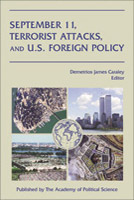
August 2002 · 200 pages
ISBN10: 1-884853-01-3
Paperback: $23.50 (APS Members: $18.80)
| Order: | Paperback |
This book looks into important policy considerations that confront a democratic state when trying to combat terrorism. A distinguished group of authors, including Walter LaFeber, Richard K. Betts, Ruth Wedgwood, and Robert Jervis, contribute authoritative insights toward explaining the causes and consequences of the terrorist attacks on September 11.
Part I: Introduction
September 11: An Overview
Demetrios James Caraley and Alexander A. Cooley
Part II: The Attacks
The Post September 11 Debate Over Empire, Globalization, and Fragmentation
Walter LaFeber
The Soft Underbelly of American Primacy: Tactical Advantages of Terror
Richard Betts
The Pragmatic Fanaticism of al Qaeda: An Anatomy of Extremism in Middle Eastern Politics
Michael Doran
Part III: The Axis of Evil
North Korea's Weapons of Mass Destruction: Badges, Shields or Swords?
Victor D. Cha
U.S. Policy Toward Iraq Since Desert Storm
Daniel Byman
CIA's Strategic Intelligence in Iraq
Richard L. Russell
Contradictions in Iranian and Indonesian Politics
Daniel Brumberg
Part IV: Looking to the Future
Al Qaeda, Military Commissions, and American Self-Defense
Ruth Wedgwood
An Interim Assessment of September 11: What Has Changed and What Has Not?
Robert Jervis
Join the Academy of Political Science and automatically receive Political Science Quarterly.
Academy Forum | The 2024 Presidential and Congressional Elections: Small Wave, Seismic Effects
WEBINAR
Jimmy Carter's Legacy
Jimmy Carter's Public Policy Ex-Presidency
John Whiteclay Chambers II
Publishing since 1886, PSQ is the most widely read and accessible scholarly journal with distinguished contributors such as: Lisa Anderson, Robert A. Dahl, Samuel P. Huntington, Robert Jervis, Joseph S. Nye, Jr., Theda Skocpol, Woodrow Wilson
view additional issuesArticles | Book reviews
The Academy of Political Science, promotes objective, scholarly analyses of political, social, and economic issues. Through its conferences and publications APS provides analysis and insight into both domestic and foreign policy issues.
With neither an ideological nor a partisan bias, PSQ looks at facts and analyzes data objectively to help readers understand what is really going on in national and world affairs.